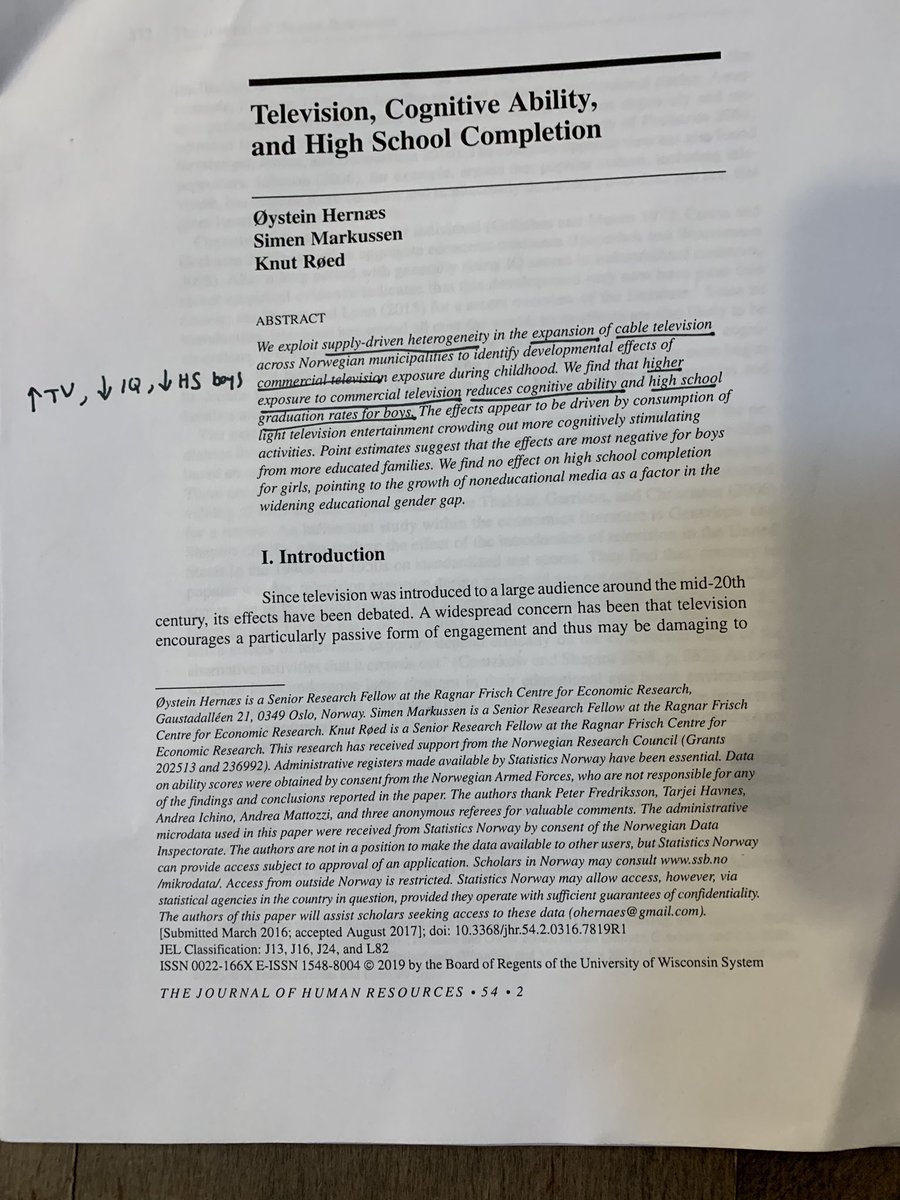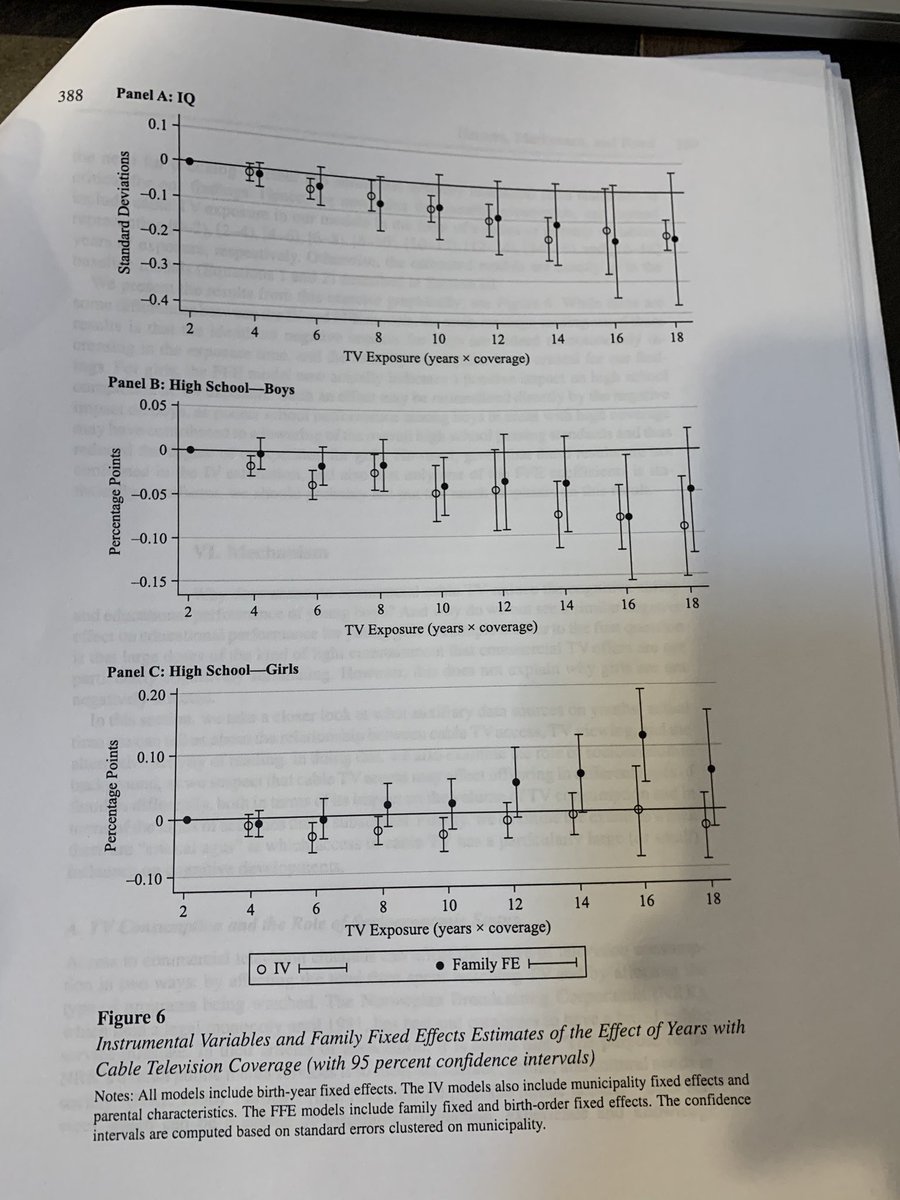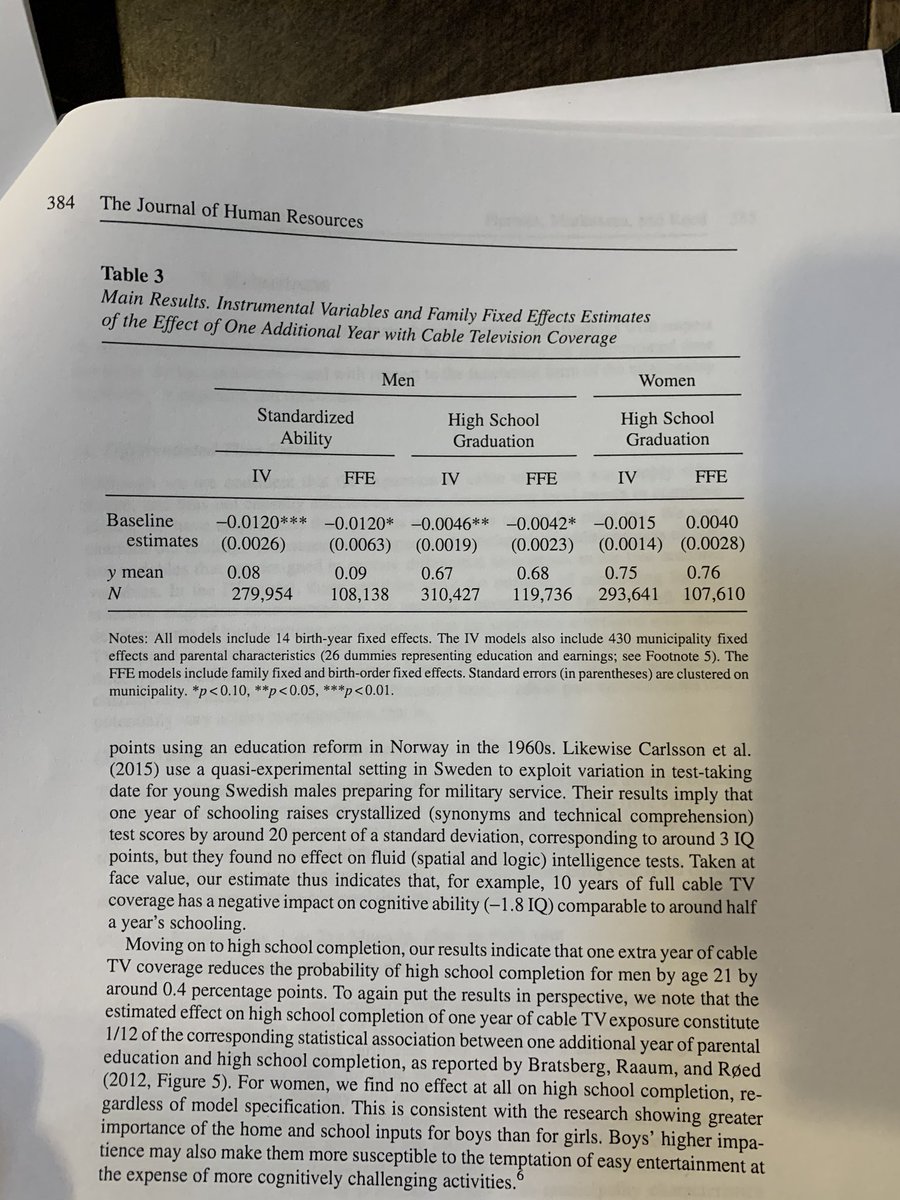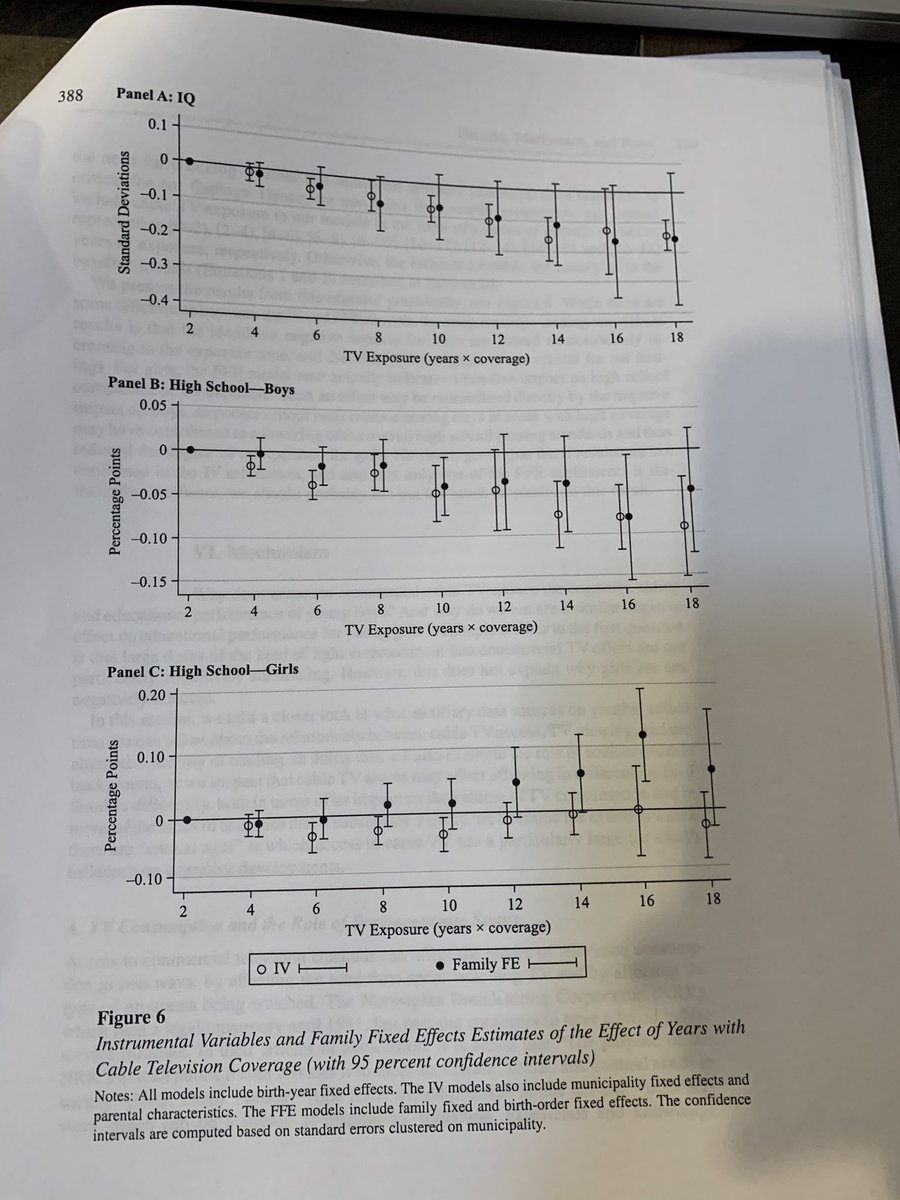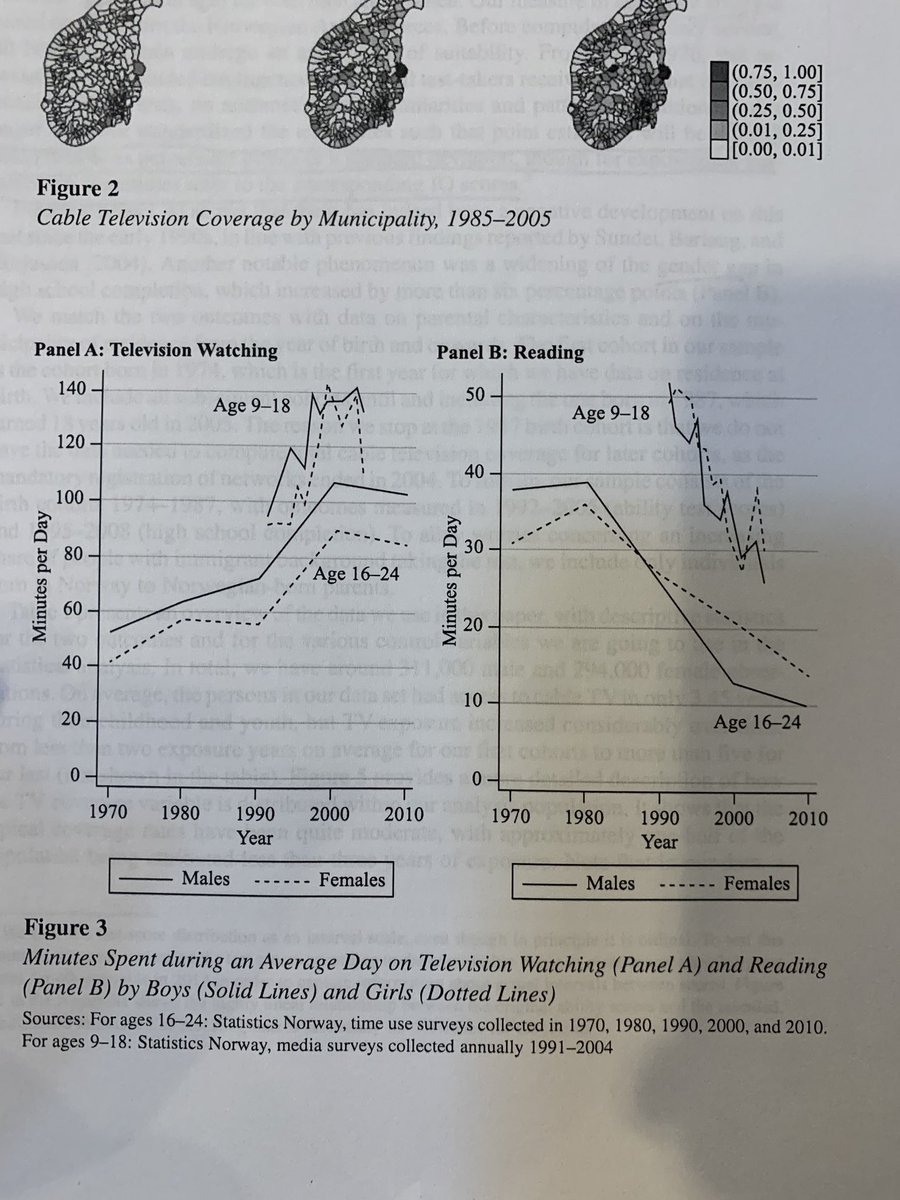Welcome to this weeku2019s #JHR_Threads! I am excited to discuss u201cTV, Cognitive Ability and High School Completionu201d by @ohernaes , @simen_markussen and Ru00f8ed in the spring 2019 issue of @J_HumanResource . Free access! http://jhr.uwpress.org/content/54/2/371.abstract">https://jhr.uwpress.org/content/5...
This is a very cool and insightful paper with lots of subtlety and implications for future work. Hereu2019s the question: is television harmful for our kids, in terms of IQ and schooling? This question is as old as TV itself. People like Neil Postman, for instance, warned us.
TV was amusing, Postman said, and we were amusing ourselves to death. Mister Rogers was so concerned about programming that he made his own. But the problem is television consumption is endogenous - itu2019s related to income, preferences, family structure, etc.
And all of these things are correlated with other things, including unobservables, and even if we found television associated with harmful outcomes, we donu2019t know thatu2019s causal bc of these myriad selection biases make the correlation very inaccurate potentially.
So we need a strategy to answer this question - something which enables us to compare two otherwise identical people with different levels of exposure, and then we have to follow these people over time and see what happens. Enter the authors.
Thereu2019s two special things in this paper apart from the importance of the question. 1) they use the notoriously amazing Norwegian data which gives them the universe of a country (yes?) linked across tons of data sources.
So here theyu2019ll have all sorts of things including high school graduation, ability test scores, and other things useful for this study. Huge, but without exogenous measures of television consumption ultimately kind of worthless. So that brings us to 2).
The second strength at answering the paper is the natural experiment. In the early 1980s, Norway deregulated TV making it legal to forward TV signals broadcast by satellites in local cable networks. This caused a rollout of cable networks across the country. You can see it here
This rollout they argue was conditionally exogenous to household characteristics which means they can use this rollout out as a natural experiment to estimate the causal effect of TV exposure on IQ and high school graduation.
They have two strategies to leverage this experiment: an IV strategy and a family fixed effects strategy. They instrument for actual TV exposure with future coverage in an individualu2019s birth region. I am going to focus mainly on their fixed effects strategy, though.
The results ultimately are similar either way, and I think readers may find the family fixed effects strategy kind of interesting. Because all these Norwegian data are linked, they know the persons family, and therefore sibling.
So family fixed effects means they are explicitly comparing two siblings exposed to different levels of TV coverage. This controls for many family specific factors, though i donu2019t think differences across the birth order. So just an FYI - insofar as you worry about that.
So what do they find? Iu2019ll focus on the beautiful pictures. They find gender differences, first thing to keep in mind. Boyu2019s cognitive ability is negatively effected by exposure but not really females. How much? 10 hrs of full cable TV coverages reduces IQ by 1.8 points
Thatu2019s about half a years worth of schooling. So thankfully itu2019s small, but detectable thanks in no small part to the outstanding data they got their hands on. But the other thing is it actually reduces boys high school graduation rates which you can see again here .
Again, effects are small, but detectable and robust. So why? Whatu2019s going on? Well, letu2019s consider the main reason many Americans worry about TV - they think itu2019s the content itself. Too much violence and/or mindless.
Go back and rewatch the shows you grew up; it was u201clightu201d entertainment by todayu2019s standards to say the least. Itu2019s barely watchable when youu2019ve become accustomed to the high quality programming around us. So maybe we are amusing ourselves to death Bc of content.
Think about the policy implications of the mechanism by which IQ and high school completion is reduced is due to low quality programming - just get better shows! More Wire and Schittu2019s Creek please!
But the authors really donu2019t think itu2019s the content that is responsible, bc they find that cable is crowding out reading via the rising tv consumption. In other words, they think itu2019s not content but rather time inputs being reallocated away from higher order tasks.
This is important bc if itu2019s true, we could watch Watchmen and Making a Murderer all day long, and it still be (POTENTIALLY) as harmful as watching reality tv and Whou2019s the Boss bc while the work required for each differs, the time inputs are the same and may draw us from reading
This got me thinking about whatu2019s going on. See, this really is a LATE but of what? Of introducing light programming in Norway. So we donu2019t know the effect of the golden age on cognitive ability. We should be careful to draw that conclusion. So FYI.
I asked @ohernaes in the interview (coming soon!) what he thought about social media, though. Itu2019s also time intensive. And he said something interesting - social media and tv are different in his mind bc social media is interpersonal. TV really isnu2019t.
And who knows what that added element does. So that was an interesting set of brakes I felt like, which helped me process the results a bit.
Thereu2019s only a handful of well identified papers estimating TVu2019s causal effects. But actually, my reading of this literature before this paper was mostly optimistic. Sesame Street, 16 and Pregnant, cable in India, etc - they seemed good. Fox News seemed ambiguous or bad
But here we find some evidence for Postmanu2019s hypothesis and it warrants serious consideration. I loved this paper. I think you should read it and assign it tbh as media has never been more ubiquitous as it is now and adolescent time use may be important things for us to know.
Look for my edited interview on YouTube soon! Great paper - read it and tell your uncle about it at thanksgiving dinner this week.

 Read on Twitter
Read on Twitter